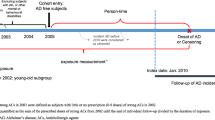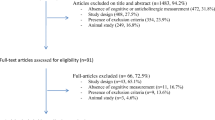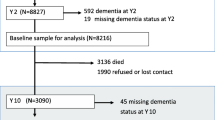Abstract
An increasing number of longitudinal cohort studies have identified a risk increase for dementia by the chronic use of drugs with anticholinergic properties. The respective data from the German Study on Aging, Cognition and Dementia in Primary Care Patients (AgeCoDe) also showing risk increase (hazard ratio = 2.081) are reported here. The mechanisms by which the risk increase is transported are still unknown. Irritation of compensated alterations of cholinergic transmission at the pre-dementia stage of Alzheimer’s disease (AD) or acceleration of neuroinflammation by disturbance of the anti-inflammatory effect of cholinergic innervation are discussed. In terms of dementia prevention, centrally acting anticholinergic drugs should be strictly avoided, because of long-term dementia risk increase in addition to acute negative effects on cognition.


Similar content being viewed by others
References
in t’ Veld BA, Ruitenberg A, Hofman A, Launer LJ, van Duijn CM, Stijnen T, Breteler MM, Stricker BH (2001) Nonsteroidal antiinflammatory drugs and the risk of Alzheimer’s disease. N Engl J Med 345:1515–1521
Zandi PP, Anthony JC, Hayden KM, Mehta K, Mayer L, Breitner JC, Cache County Study Investigators (2002) Reduced incidence of AD with NSAID but not H2 receptor antagonists: the Cache County Study. Neurology 59:880–886
Thal LJ, Ferris SH, Kirby L, Block GA, Lines CR, Yuen E, Assaid C, Nessly ML, Norman BA, Baranak CC, Reines SA, Rofecoxib Protocol 078 study group (2005) A randomized, double-blind, study of rofecoxib in patients with mild cognitive impairment. Neuropsychopharmacology 30:1204–1215
ADAPT Research Group, Martin BK, Szekely C, Brandt J, Piantadosi S, Breitner JC, Craft S, Evans D, Green R, Mullan M (2008) Cognitive function over time in the Alzheimer’s Disease Anti-inflammatory Prevention Trial (ADAPT): results of a randomized, controlled trial of naproxen and celecoxib. Arch Neurol 65:896–905
Wolozin B, Kellman W, Ruosseau P, Celesia GG, Siegel G (2000) Decreased prevalence of Alzheimer disease associated with 3-hydroxy-3-methyglutaryl coenzyme A reductase inhibitors. Arch Neurol 57:1439–1443
Haag MD, Hofman A, Koudstaal PJ, Stricker BH, Breteler MM (2009) Statins are associated with a reduced risk of Alzheimer disease regardless of lipophilicity. The Rotterdam study. J Neurol Neurosurg Psychiatry 80:13–17
Peila R, White LR, Masaki K, Petrovitch H, Launer LJ (2006) Reducing the risk of dementia: efficacy of long-term treatment of hypertension. Stroke 37:1165–1170
Shah K, Qureshi SU, Johnson M, Parikh N, Schulz PE, Kunik ME (2009) Does use of antihypertensive drugs affect the incidence or progression of dementia? A systematic review. Am J Geriatr Pharmacother 7:250–261
Egger SS, Bachmann A, Hubmann N, Schlienger RG, Krähenbühl S (2006) Prevalence of potentially inappropriate medication use in elderly patients: comparison between general medical and geriatric wards. Drugs Aging 23:823–837
Tune LE (2001) Anticholinergic effects of medication in elderly patients. J Clin Psychiatry 62:11–14
Low LF, Anstey KJ, Sachdev P (2009) Use of medications with anticholinergic properties and cognitive function in a young-old community sample. Int J Geriatr Psychiatry 24:578–584
Ancelin ML, Artero S, Portet F, Dupuy AM, Touchon J, Ritchie K (2006) Non-degenerative mild cognitive impairment in elderly people and use of anticholinergic drugs: longitudinal cohort study. BMJ 332:455–459
Carrière I, Fourrier-Reglat A, Dartigues JF, Rouaud O, Pasquier F, Ritchie K, Ancelin ML (2009) Drugs with anticholinergic properties, cognitive decline, and dementia in an elderly general population: the 3-city study. Arch Intern Med 169:1317–1324
Campbell NL, Boustani MA, Lane KA, Gao S, Hendrie H, Khan BA, Murrell JR, Unverzagt FW, Hake A, Smith-Gamble V, Hall K (2010) Use of anticholinergics and the risk of cognitive impairment in an African American population. Neurology 75:152–159
Boustani MA, Campbell NL, Mungers S, Maidment I, Fox GC (2008) Impact of anticholinergics on the aging brain: a review and practical applications. Aging Health 4:311–320
Jessen F, Wiese B, Bachmann C, Eifflaender-Gorfer S, Haller F, Kölsch H, Luck T, Mösch E, van den Bussche H, Wagner M, Wollny A, Zimmermann T, Pentzek M, Riedel-Heller SG, Romberg HP, Weyerer S, Kaduszkiewicz H, Maier W, Bickel H, German Study on Aging, Cognition and Dementia in Primary Care Patients Study Group (2010) Prediction of dementia by subjective memory impairment: effects of severity and temporal association with cognitive impairment. Arch Gen Psychiatry 67:414–422
Chew ML, Mulsant BH, Pollock BG, Lehman ME, Greenspan A, Mahmoud RA, Kirshner MA, Sorisio DA, Bies RR, Gharabawi G (2008) Anticholinergic activity of 107 medications commonly used by older adults. J Am Geriatr Soc 56:1333–1341
Gilles C, Luthringer R (2007) Pharmacological models in healthy volunteers: their use in the clinical development of psychotropic drugs. J Psychopharmacol 21:272–282
Mesulam M, Shaw P, Mash D, Weintraub S (2004) Cholinergic nucleus basalis tauopathy emerges early in the aging-MCI-AD continuum. Ann Neurol 55:815–828
Grothe M, Zaborszky L, Atienza M, Gil-Neciga E, Rodriguez-Romero R, Teipel SJ, Amunts K, Suarez-Gonzalez A, Cantero JL (2010) Reduction of basal forebrain cholinergic system parallels cognitive impairment in patients at high risk of developing Alzheimer’s disease. Cereb Cortex 20:1685–1695
Muth K, Schönmeyer R, Matura S, Haenschel C, Schröder J, Pantel J (2010) Mild cognitive impairment in the elderly is associated with volume loss of the cholinergic basal forebrain region. Biol Psychiatry 67:588–591
Herholz K (2008) Acetylcholine esterase activity in mild cognitive impairment and Alzheimer’s disease. Eur J Nucl Med Mol Imaging 35:25–29
DeKosky ST, Ikonomovic MD, Styren SD, Beckett L, Wisniewski S, Bennett DA, Cochran EJ, Kordower JH, Mufson EJ (2002) Upregulation of choline acetyltransferase activity in hippocampus and frontal cortex of elderly subjects with mild cognitive impairment. Ann Neurol 51:145–155
Ikonomovic MD, Abrahamson EE, Isanski BA, Wuu J, Mufson EJ, DeKosky ST (2007) Superior frontal cortex cholinergic axon density in mild cognitive impairment and early Alzheimer disease. Arch Neurol 64:1312–1317
Tracey KJ (2002) The inflammatory reflex. Nature 420:853–859
De Simone R, Ajmone-Cat MA, Carnevale D, Minghetti L (2005) Activation of α7 nicotinic acetylcholine receptor by nicotine selectively up-regulates cyclooxygenase-2 and prostaglandin E2 in rat microglial cultures. J Neuroinflammation 2:4
van Gool WA, van de Beek D, Eikelenboom P (2010) Systemic infection and delirium: when cytokines and acetylcholine collide. Lancet 375:773–775
Acknowledgments
The study was supported by the German Competence Network on Dementia (CND) and by the German Competence Network on Degenerative Dementias (CNDD) funded by the German Federal Ministry for Education and Research (grants: O1GI 0102, 01 GI 0710, 01 GI 0711, 01 GI 0712, 01 GI 0713, 01 GI 0714, 01 GI 0715, 01 GI 0716, 01 GI 0717) and the Federal Institute for Drugs and Medical Devices (Bundesinstitut für Arzneimittel und Medizinprodukte, BfArM) grant: V-9909/68502/2008.
Conflict of interest
Frank Jessen has received research grants respectively from, is member of the Advisory Boards of, or draws a fee for speech from the following companies: Pfizer, Esai, Janssen Cilag, Novarits, Talecris, Altana Pharma, Octapharma, Merz, and AC Immune.
Horst Bickel has received research support from Organon and Dr. Wilmar Schwabe and fees for lectures from Bayer, Merz, Lundbeck, Dr. Wilmar Schwabe, and Wyeth.
Siegfried Weyerer has received research grants or draws a fee for speech from the following companies: AstraZeneca, Bristol-Myers Squibb, Eli Lilly, Janssen Cilag, Novartis, Pfizer, and Wyeth.
Wolfgang Maier has received research grants respectively from, is member of the Advisory Boards, or draws a fee for speech from the following companies: AstraZeneca, Bristol-Myers Squibb, Eli Lilly, Janssen Cilag, Lundbeck, Merck, Pfizer, Sanofi Aventis, Schering, and Böhringer.
Moritz Daerr, Karl Broich, Michael Pentzek, Steffi Riedel-Heller, Michael Wagner, Birgitt Wiese, Hendrik van den Bussche, and Hanna Kaduszkiewicz declare that they do not have any conflict of interest.
Author information
Authors and Affiliations
Corresponding author
Additional information
Frank Jessen and Hanna Kaduszkiewicz equally contributed to this work.
Rights and permissions
About this article
Cite this article
Jessen, F., Kaduszkiewicz, H., Daerr, M. et al. Anticholinergic drug use and risk for dementia: target for dementia prevention. Eur Arch Psychiatry Clin Neurosci 260 (Suppl 2), 111–115 (2010). https://doi.org/10.1007/s00406-010-0156-4
Received:
Accepted:
Published:
Issue Date:
DOI: https://doi.org/10.1007/s00406-010-0156-4




